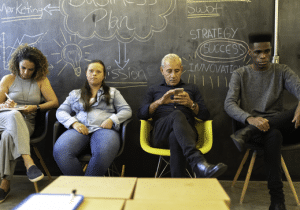How Can I Tell if the Interviewer is Trained or Untrained?
We train hiring managers and recruiters at global organizations how to conduct structured interviews, what to ask, what to listen for and what to evaluate. We give you this information inside Interview Ready.
TRAINED INTERVIEWERS
Trained interviewers are taught to control the interview. They need to extract as much information about your past performance in key situations and tasks as possible in the allotted time. They are taught to listen 90% and talk 10% (simply guide the conversation and clarify where needed). They are making a very expensive investment for the company and they need to hire high performers that can do the job, will do the job, and will fit with the culture, teams, and management.
Unfortunately, many books and articles advise job candidates to take over the interview and start asking questions to show their interest and motivation. This advice may work with untrained interviewers, but a trained interviewer will stop you and politely remind you that they have reserved a few minutes at the end of the interview for your questions. They are the buyer. They need to learn as much about you as possible in a very short time.
The trained interviewer is laser-focused. They spent time identifying the key situations and tasks you will need to perform extremely well and then they build questions to get that information from you during the interview. The follow-up questions explore your answers in greater detail.
Each question created has benchmarks of how the organization’s high and low performer does that task or works in that situation. Your answers will be compared to known benchmarks to help the interviewer/panel make an unbiased, performance-based hiring decision.
We train hiring managers to avoid emotional hiring and to recognize their emotional state within 30 seconds of meeting you. If they are very comfortable or uptight, they have made an emotional decision and are taught techniques to neutralize that emotional (minimize their biases) state to give you every possible opportunity to get the job.
Interviewers are taught to be excellent listeners and pick up on inconsistencies in your answers. Candidates who win job offers give rich, detailed examples from their past experiences. They provide names, dates, and vivid descriptions to each question the interviewer asks using the P.A.R. method (Problem, Action taken, Result). Therefore, you must practice answering your interview questions out loud using a timer (more info on this inside Interview Ready).
UNTRAINED INTERVIEWERS
Untrained interviewers tend to hire based on gut instinct, emotions, biases, and first impressions. To win, you need to remove as many biases as possible in the first minute.
Dress the part. The first impression is crucial. Don’t give the interviewer any reason to form a negative first impression.
Smile. Hiring managers want to work with friendly people. The first impression answers the question “do I want to work with this person daily?”
Use positive body language. Sit up, lean in, and listen attentively. Let the untrained interviewer talk and pick up on key statements they mention. Highlight them in your answers.
Chances are that the untrained interviewer decided your fate during the first few minutes and is using the rest of the interview to validate that initial decision. This is known as confirmation bias or first impression bias.
Untrained interviewers tend to ask hypothetical questions. Why do you want this job? What are your strengths/weaknesses? How would you do something? They do not realize those questions are low-yield and that your answer is an opinion that can’t be substantiated. If you give an answer that fits with what they want to hear, you get points.
Most untrained interviewers want to be liked, so they oversell. They do most of the talking since they already decided they want you based on your resume and initial phone conversation. Unfortunately, they don’t get to know the real you or allow you time to get to know them, their needs, key job requirements, or their culture.
We tend to see high turnover and low employee engagement in organizations that do not use a structured hiring process. Interview Ready gives you a deeper understanding of how to excel if you interview with an untrained interviewer.









